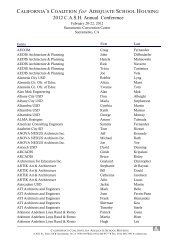Senate Bill 50 and School Facility Fees - California's Coalition for ...
Senate Bill 50 and School Facility Fees - California's Coalition for ...
Senate Bill 50 and School Facility Fees - California's Coalition for ...
Create successful ePaper yourself
Turn your PDF publications into a flip-book with our unique Google optimized e-Paper software.
act . . . on the provision of adequate school facilities." Section 65995(i) prohibits an agency from<br />
denying or refusing to approve a legislative or adjudicative act involving development "on the<br />
basis of a person's refusal to provide school facilities mitigation that exceeds the amounts<br />
authorized [by SB <strong>50</strong>]."<br />
As with the limitations on the police power in Government Code Section 65995, SB <strong>50</strong> makes its<br />
limitations on a city's or county's power under CEQA to mitigate school facilities impacts<br />
applicable to both adjudicative <strong>and</strong> legislative decisions. The new version of Government Code<br />
Section 65996 also recites that the development fees authorized by SB <strong>50</strong> are deemed to be "full<br />
<strong>and</strong> complete school facilities mitigation" <strong>for</strong> the purposes of CEQA or <strong>for</strong> any other reason. A<br />
local agency may not deny approval of a legislative or adjudicative action under CEQA relating<br />
to real estate development on the basis of the inadequacy of school facilities.<br />
D. Restoration of Power to Deny Legislative Approvals. If at a statewide election in 2006 or<br />
thereafter, a statewide general obligation measure <strong>for</strong> school facilities is submitted to the voters<br />
<strong>and</strong> the measure is not approved, Government Code Section 65996 would become inoperative<br />
<strong>and</strong> the provisions of Section 65997 would go into effect. Section 65997(d) provides that<br />
"notwithst<strong>and</strong>ing any other provision of law [which would include Section 65995(i)], a public<br />
agency may refuse to approve a legislative act" involving property development on the basis that<br />
school facilities are inadequate. While Section 65997 would permit a complete denial of a<br />
legislative development approval, it still would prohibit a public agency to require payment of "a<br />
fee, charge, dedication, or other financial requirement" in excess of those authorized by SB <strong>50</strong> as<br />
a condition of approval. It would also prohibit a public agency from denying, pursuant to CEQA,<br />
approval of a project on the basis of the adequacy of school facilities.<br />
E. The Effects of SB <strong>50</strong> on Mello-Roos Districts. SB <strong>50</strong> <strong>for</strong>bids requiring the use of the<br />
Mello-Roos financing <strong>for</strong> schools as a condition of approval of any legislative or adjudicative<br />
action. A person's refusal to participate in a Mello-Roos school funding program may not be<br />
taken into account when considering any legislative or adjudicative action relating to l<strong>and</strong><br />
development. If a person voluntarily participates in a Mello-Roos program approved by<br />
l<strong>and</strong>owner vote, the present value of the taxes to be paid are to be calculated as an amount per<br />
square foot of assessable space <strong>and</strong> credited against any developer fee liability.<br />
Mello-Roos taxes may still be used to make new development bear more of the costs that it<br />
imposes on school districts. To comply with SB <strong>50</strong> however, the taxes would need to be<br />
approved by two-thirds of the registered voters within the boundaries of a Mello-Roos district<br />
created by the school district (which could include the entire school district territory). Because<br />
the tax is approved by registered voters rather than l<strong>and</strong>owners, the amount of the tax is not an<br />
offset to developer fees (although it would be taken into account in the justification studies done<br />
<strong>for</strong> the developer fees). It may also be possible <strong>for</strong> a school district to propose to its voters that<br />
they approve a Mello-Roos tax that is levied on any property that receives approval <strong>for</strong><br />
development that will lead to increased enrollment on the theory that the tax is not a condition to<br />
the approval of development; it is a consequence of that approval.<br />
F. Site Designation. SB <strong>50</strong> severely limits cities' <strong>and</strong> counties' consideration of school facilities<br />
issues in the l<strong>and</strong> use approval process, but one section of the new law preserves the traditional<br />
power of cities <strong>and</strong> counties to use the general plan <strong>and</strong> zoning to reserve areas <strong>for</strong> schools. New<br />
Section 65998 of the Government Code states that nothing in SB<strong>50</strong> shall be interpreted to "limit





